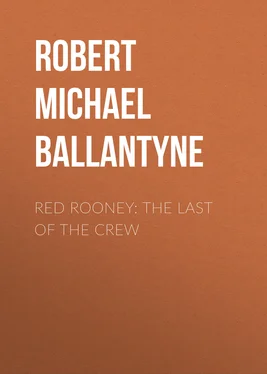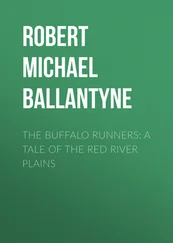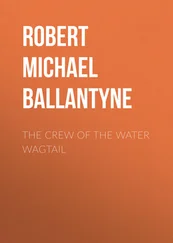Robert Michael Ballantyne - Red Rooney - The Last of the Crew
Здесь есть возможность читать онлайн «Robert Michael Ballantyne - Red Rooney - The Last of the Crew» — ознакомительный отрывок электронной книги совершенно бесплатно, а после прочтения отрывка купить полную версию. В некоторых случаях можно слушать аудио, скачать через торрент в формате fb2 и присутствует краткое содержание. Жанр: Детские приключения, literature_19, foreign_antique, foreign_prose, foreign_children, на английском языке. Описание произведения, (предисловие) а так же отзывы посетителей доступны на портале библиотеки ЛибКат.
- Название:Red Rooney: The Last of the Crew
- Автор:
- Жанр:
- Год:неизвестен
- ISBN:нет данных
- Рейтинг книги:5 / 5. Голосов: 1
-
Избранное:Добавить в избранное
- Отзывы:
-
Ваша оценка:
- 100
- 1
- 2
- 3
- 4
- 5
Red Rooney: The Last of the Crew: краткое содержание, описание и аннотация
Предлагаем к чтению аннотацию, описание, краткое содержание или предисловие (зависит от того, что написал сам автор книги «Red Rooney: The Last of the Crew»). Если вы не нашли необходимую информацию о книге — напишите в комментариях, мы постараемся отыскать её.
Red Rooney: The Last of the Crew — читать онлайн ознакомительный отрывок
Ниже представлен текст книги, разбитый по страницам. Система сохранения места последней прочитанной страницы, позволяет с удобством читать онлайн бесплатно книгу «Red Rooney: The Last of the Crew», без необходимости каждый раз заново искать на чём Вы остановились. Поставьте закладку, и сможете в любой момент перейти на страницу, на которой закончили чтение.
Интервал:
Закладка:
“I suppose,” resumed the Eskimo, “that Kablunets never deceive themselves or others; they are too wise. Is it so?”
“Well, now you put the question,” said Rooney, “I rather fear that some of us do, occasionally; an’ there’s not a few who have a decided tendency to deceive others. And so that is the reason you won’t be an angekok, is it? Well, it does you credit. But what sort o’ things do they believe, in these northern regions, that you can’t go in with? Much the same, I fancy, that the southern Eskimos believe?”
“I know not what the southern Eskimos believe, for I have met them seldom. But our angekoks believe in torngaks, familiar spirits, which they say meet and talk with them. There is no torngak. It is a lie.”
“But you believe in one great and good Spirit, don’t you?” asked the seaman, with a serious look.
“Yes; I believe in One,” returned the Eskimo in a low voice, “One who made me, and all things, and who must be good.”
“There are people in my land who deny that there is One, because they never saw, or felt, or heard Him—so they say they cannot know,” said Rooney. Angut looked surprised.
“They must be fools,” he said. “I see a sledge, and I know that some man made it—for who ever heard of a sledge making itself? I see a world, and I know that the Great Spirit made it, because a world cannot make itself. The greatest Spirit must be One, because two greatests are impossible, and He is good—because good is better than evil, and the Greatest includes the Best.”
The seaman stared, as well he might, while the Eskimo spoke these words, gazing dreamily at the lamp-flame, as if he were communing with his own spirit rather than with his companion. Evidently Okiok had a glimmering of what he meant, for he looked pleased as well as solemn.
It might be tedious to continue the conversation. Leaving them therefore to their profound discussions, we will turn to another and very different social group.
Chapter Seven.
Treats of Cross-Purposes and Difficulties
Partially concealed in a cavern at the base of a stupendous, almost perpendicular, cliff, stood the wizard Ujarak and his pupil Ippegoo. The former silently watched the latter as he fitted a slender spear, or rather giant arrow, to a short handle, and prepared to discharge it at a flock of sea-birds which were flying about in front of them within what we would call easy gunshot.
The handle referred to acted as a short lever, by means of which the spear could be launched not only with more precision but with much greater force than if thrown simply by hand like a javelin.
“There, dart it now!” cried Ujarak, as a bird swept close to the cave’s mouth. “Boh! you are too slow. Here is another; quick! dart!”
Ippegoo let fly hastily, and missed.
“Poo! you are of no more use than the rotten ice of spring. There; try again,” said Ujarak, pointing to a flock of birds which came sweeping towards them.
The crestfallen youth fitted another spear to the handle—for he carried several—and launched it in desperation into the middle of the flock. It ruffled the wings of one bird, and sent it screaming up the cliffs, but brought down none.
“Boo!” exclaimed the wizard, varying the expression of his contempt. “It is well that your mother has only a small family.”
Ippegoo was accustomed to severe backhanders from his patron; he was not offended, but smiled in a pathetic manner as he went out in silence to pick up his weapons.
Just as he was returning, Arbalik, nephew to the jovial Simek, appeared upon the scene, and joined them. The wizard appeared to be slightly annoyed, but had completely dissembled his feelings when the young man walked up.
“Have the hunters found no seals?” asked Ujarak.
“Yes, plenty,” answered Arbalik cheerily, for he had a good deal of his old uncle’s spirit in him, “but you know variety is agreeable. Birds are good at a feast. They enable you to go on eating when you can hold no more seal or walrus blubber.”
“That is true,” returned the wizard, with a grave nod of appreciation. “Show Ippegoo how to dart the spear. He is yet a baby!”
Arbalik laughed lightly as he let fly a spear with a jaunty, almost careless, air, and transfixed a bird on the wing.
“Well done!” cried the wizard, with a burst of genuine admiration; “your wife will never know hunger.”
“Not after I get her,” returned the youth, with a laugh, as he flung another spear, and transfixed a second bird.
Ippegoo looked on with slightly envious but not malevolent feelings, for he was a harmless lad.
“Try again,” cried Arbalik, turning to him with a broad grin, as he offered him one of his own spears.
Ippegoo took the weapon, launched it, and, to his own great surprise and delight, sent it straight through the heart of a bird, which fell like a stone.
A shout of pleasure burst from Arbalik, who was far too good a shot to entertain mean feelings of jealousy at the success of others.
“It is the luck of the spear,” said Ujarak, “not the skill of the hunter.”
This would have been an unkind cut to ordinary mortals, but it fell as harmless on Ippegoo as water on the back of the eider-duck. A snub from the wizard he took almost as a compliment, and the mere success of his shot afforded him unbounded pleasure.
The good-natured Arbalik offered him another spear, but Ujarak interposed.
“No; Ippegoo must come with me,” he said. “I have work for him to do. One who would be an angekok must leave bird-spearing to boys.” Then turning to Arbalik—“Did you not say that the hunters have found plenty of game?”
“Yes, plenty.”
“I told you so,” said the wizard, using a phrase not unfamiliar to civilised ears. “Remain here, and spear plenty of birds; or go where you will.”
Having thus graciously given the youth free permission to do as he pleased—which Arbalik received with inward scorn, though outward respect—he left the cave, followed meekly by his satellite.
After walking in silence till well out of earshot of the expert young hunter, the wizard said in solemn tones—
“Ippegoo, I have work of more importance for you to do than spearing birds—work that requires the wisdom of a young angekok.”
All Ujarak’s backhanders vanished before this confidential remark, and the poor tool began to feel as if he were growing taller and broader even as he walked.
“You know the hut of Okiok?” continued the wizard.
“Yes; under the ice-topped cliff.”
“Well, Angut is there. I hate Angut!”
“So do I,” said Ippegoo, with emphasis quite equal to that of his master.
“And Nunaga is there,” continued Ujarak. “I—I love Nunaga!”
“So do I,” exclaimed Ippegoo fervently, but seeing by the wizard’s majestic frown that he had been precipitate, he took refuge in the hasty explanation—“Of course I mean that—that—I love her because you love her. I do not love her for herself. If you did not love her, I would hate her. To me she is not of so much value as the snout of a seal.”
The wizard seemed pacified, for his frown relaxed, and after a few moments’ thought he went on savagely—
“Angut also loves Nunaga.”
“The madman! the insolent! the fool!” exclaimed Ippegoo; “what can he expect but death?”
“Nothing else, and nothing less,” growled the wizard, clenching his teeth—“ if he gets her! But he shall never get her! I will stop that; and that is why I ask you to listen—for you must be ready to act, and in haste.”
As Ippegoo began to entertain uncomfortable suspicions that the wizard was about to use him as an instrument of vengeance, he made no response whatever to the last remark.
Читать дальшеИнтервал:
Закладка:
Похожие книги на «Red Rooney: The Last of the Crew»
Представляем Вашему вниманию похожие книги на «Red Rooney: The Last of the Crew» списком для выбора. Мы отобрали схожую по названию и смыслу литературу в надежде предоставить читателям больше вариантов отыскать новые, интересные, ещё непрочитанные произведения.
Обсуждение, отзывы о книге «Red Rooney: The Last of the Crew» и просто собственные мнения читателей. Оставьте ваши комментарии, напишите, что Вы думаете о произведении, его смысле или главных героях. Укажите что конкретно понравилось, а что нет, и почему Вы так считаете.












